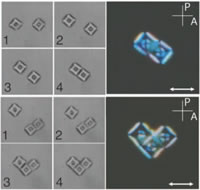 When an object, such as a colloidal particle, is put into a liquid crystal, it alters the otherwise uniform orientation of the molecules, creating a field of orientational disturbance around itself. This field acts on the object to align it with particular orientation relative to the average liquid crystal direction, indicated by the arrows in the image. If two or more objects are immersed, then their respective fields will overlap and, as a result, the objects can exert forces on one another. Center researchers are exploring the role of the shape of the colloidal particle in such liquid crystal-mediated interactions, showing that for flat, polygonal sheets the number of sides is a key property of the particle. The image shows 4.5x4.5 µm square x 1 µm thick particles interacting in a nematic liquid crystal, exhibiting a tendency to orient with their edges oriented at an angle of 45º from the long molecular axis (arrows), and to adhere to one another edge-to-edge.
When an object, such as a colloidal particle, is put into a liquid crystal, it alters the otherwise uniform orientation of the molecules, creating a field of orientational disturbance around itself. This field acts on the object to align it with particular orientation relative to the average liquid crystal direction, indicated by the arrows in the image. If two or more objects are immersed, then their respective fields will overlap and, as a result, the objects can exert forces on one another. Center researchers are exploring the role of the shape of the colloidal particle in such liquid crystal-mediated interactions, showing that for flat, polygonal sheets the number of sides is a key property of the particle. The image shows 4.5x4.5 µm square x 1 µm thick particles interacting in a nematic liquid crystal, exhibiting a tendency to orient with their edges oriented at an angle of 45º from the long molecular axis (arrows), and to adhere to one another edge-to-edge.